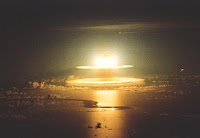 The Obama diplomacy must be working. In the past few months, there have been great strives in nuclear nonproliferation as well as reduction of existing warheads, despite some very volatile regimes.
The Obama diplomacy must be working. In the past few months, there have been great strives in nuclear nonproliferation as well as reduction of existing warheads, despite some very volatile regimes.One of the biggest announcements thus far has been the agreement between President Obama and Russian President Medvedev with the stated goal of reducing the world's two largest nuclear stockpiles by as much as 33%, which would be the the lowest levels of any U.S.-Russia accord. Because the US and Russia account for almost 90% of the worlds nuclear weapons, this is a great first step. Russia, however, is not the biggest obstacle at the moment, that title is shared by Iran and North Korea.
President Obama made clear during his campaign that he would persue a new strategy of mutual respect and diplomacy, which is appears to be upholding. He has already extended a hand to the Iranian regime, it's up to them to reach back. For those who missed it, Obama set forth his plan for Iran in his speech in Cairo:
That is the talk I like to see out of my president. Hilary Clinton, however, was a bit less eloquent in her appearance on Meet the Press this weekend when she said that Iran does “not have the right to obtain a nuclear weapon” and continued to say, with a total lack of irony:This issue has been a source of tension between the United States and the Islamic Republic of Iran. For many years, Iran has defined itself in part by its opposition to my country, and there is in fact a tumultuous history between us. In the middle of the Cold War, the United States played a role in the overthrow of a democratically elected Iranian government. Since the Islamic Revolution, Iran has played a role in acts of hostage-taking and violence against U.S. troops and civilians. This history is well known. Rather than remain trapped in the past, I've made it clear to Iran's leaders and people that my country is prepared to move forward. The question now is not what Iran is against, but rather what future it wants to build.
I recognize it will be hard to overcome decades of mistrust, but we will proceed with courage, rectitude and resolve. There will be many issues to discuss between our two countries, and we are willing to move forward without preconditions on the basis of mutual respect. But it is clear to all concerned that when it comes to nuclear weapons, we have reached a decisive point. This is not simply about America's interests. It's about preventing a nuclear arms race in the Middle East that could lead this region and the world down a hugely dangerous path.
I understand those who protest that some countries have weapons that others do not. No single nation should pick and choose which nation holds nuclear weapons. And that's why I strongly reaffirmed America's commitment to seek a world in which no nations hold nuclear weapons. (Applause.) And any nation — including Iran — should have the right to access peaceful nuclear power if it complies with its responsibilities under the Nuclear Non-Proliferation Treaty. That commitment is at the core of the treaty, and it must be kept for all who fully abide by it. And I'm hopeful that all countries in the region can share in this goal.
“What we want to do is to send a message to whoever is making these decisions, that if you’re pursuing nuclear weapons for the purpose of intimidating, of projecting your power, we’re not going to let that happen,” Clinton said. “Your pursuit is futile.”Though Iran's nuclear ambitions are a major focus, North Korea successfully tested a nuclear device earlier this year and has been claiming that any attempt to enforce the new UN sanctions, such as boarding/inspecting any North Korean ship, would be considered an act of war. , even going as far as saying that it would "wipe the United States off the map." The good news, however, is that North Korea's Foreign Minister said over the weekend that it may be open to new negotiations on its nuclear program as long as they are held outside of the upcoming six-party talks, including the U.S., China, Russia, South Korea and Japan.
Now, we just have to wait and see if the talk translates into action.





No comments:
Post a Comment